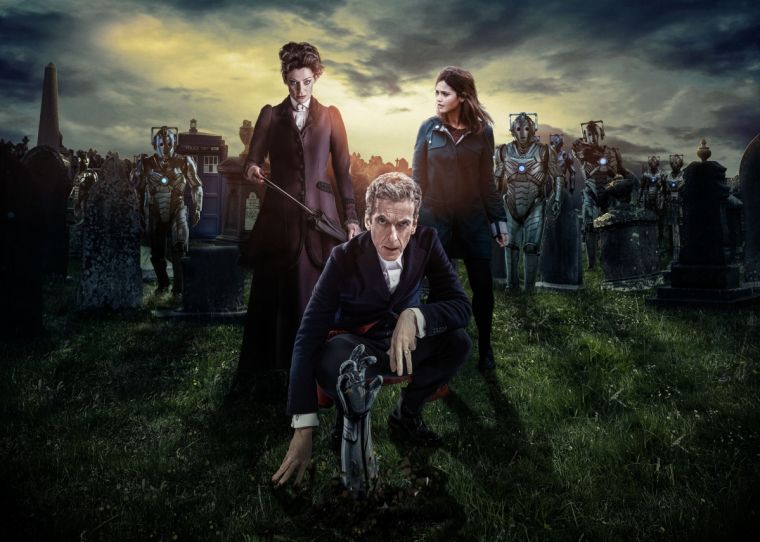Krish Kandiah: Dr Who, death and resurrection

"Don't touch me or I will turn into a vegetable" is apparently what I woke up shouting. I was a young boy on a sleepover at my aunt's house and had been allowed to stay up and watch my first ever episode of Doctor Who. Thirty five years later, it still comes up at family gatherings.
Hiding behind the sofa scared out of your mind on a Saturday night has become a typically British rite of passage. So what were people expecting for part one of the season finale the night after Halloween? If the complaint letters are to be believed, it certainly wasn't the dark fear factor of last week's 'Dark Water' episode.
Our family has been avid watchers of Dr Who for years, and we really enjoyed the subtle references as well as the in-your-face scariness of that episode. As well as objections from those who found it offensive, it also raises some very big existential questions. Perhaps the two are inextricable.
*Spoiler alert*
How far would we be willing to go to get our loved ones back again?
The show starts with a death - Danny Pink. He has had a mixed reception from Whovians, but even the most hard-hearted fan must have felt a bit sorry for him dying midway through Clara's declaration of undying love. Oswald is willing to betray, and even blackmail, the Doctor in order to get Danny back from the dead.
Time Travel raise some interesting questions when it comes to reclaiming people from death. The most notable example may be Rose Tyler's dad who in one timeline is rescued from certain death but these interventions set off a "temporal paradox" which altered the future of humanity and so forced the Doctor to goes back in time to reset the paradox. (Of course almost every Dr Who episode involves him saving people from certain death, which would surely cause other unforeseen consequences for a timeline and so presumably other "temporal paradoxes", but let's not dwell on that conundrum).
The crux is that when someone we love dies, one of the most overwhelming feelings is the permanence of it. There is a feeling of helplessness - nothing can bring them back or fill the gaping hole they leave. How wonderful it would be if somebody could match the promise on arriving in the Nethersphere to Clara that "We're here to get your boyfriend back from the dead. So back up and give me some attitude". It's hard not to draw parallels with the true Lord of Time who also embarked on a rescue mission to bring back those trapped by death...
What happens after we die?
The objections to last Saturday's episode were around the decoding of the white noise on the television interference. The "three words" that prompted the name for the company 3W were "Don't cremate me" - which implied that the dead experience what happens to their bodies beyond death. I arranged and led the cremation service for my mother, so I can understand why people might be upset about this.
With around 500,000 deaths a year in the UK, averaging about 1370 deaths a day, it is not surprising that for many people the subject matter is raw. But death, funerals and grieving force us to consider our own mortality, and questioning what happens after death and this is not a bad thing. The concerns have been around in contemporary fiction long before this episode of Dr Who. Films like: Flatliners, Sixth Sense, Requiem for a Dream and Hereafter also explore our fears about life after death. Noted children's author Patrick Ness starts his creative science fiction novel "More than This" with the death of the main character who then awakes in the afterlife. The book of Ecclesiastes also forces its readers to confront the implications of death when it states:
For the living know that they will die,
but the dead know nothing;
they have no further reward,
and even their name is forgotten.
Their love, their hate
and their jealousy have long since vanished;
never again will they have a part
in anything that happens under the sun.
Although death is apparently an end, there is a common sneaking suspicion, or indeed a longing, that when we breathe our last in this life, it is actually the beginning of an enduring one. Christians should not be squeamish about discussing this deep longing, or about helping our friends and neighbours come to thought-through conclusions about what happens next.
Is resurrection possible?

What was it that gave it away for you? Was it the tear iconography? Was it the word 'exoskeleton'? Before the waters were drained away, many of us knew the Cybermen were going to rise. Whatever it was that tipped you off, the Doctor has a seemingly impossible task to defeat his enemies. No matter what befalls them you expect the Daleks and the Cybermen to keep coming back for more. The ruse behind the 3W company, that we can somehow hang on to our association with those that have passed away, is appealing. But the Doctor is promising more than that to Clara. He is promising to bring back Danny from the dead. It would seem cruel to offer her such hope if it is all in vain. Similarly the apostle Paul argues that if the resurrection of the dead is just a myth then "If only for this life we have hope in Christ, we are of all people most to be pitied." 1 Corinthians 15:19. The hope of the resurrection is just cruel if it proves invalid, however Christians are called to stake their life on it. This episode of Dr Who challenges me to be like Paul who penned those words, willing to courageously live all out for Christ, and pass on the promise of resurrection to all who live.
The first season of Dr Who's latest incarnation with the actor Peter Capaldi seems to have effectively resurrected a series that looked in trouble with the exit of the brilliant Matt Smith from its cast.
The finale of the season, despite the discomfort of many audience members who struggle with the issues it has raised, and the fears it has provoked promises to end the season with a bang. I will be joining Dr Who fans around the world hoping the season finale lives up to the promise of the penultimate episode. Can Danny be saved? Will there be rescue and resurrection? If you are watching; whether on or behind your sofa, I hope you have time to reflect on some of the big questions it raises.
Dr Krish Kandiah is the founder of Home for Good, a charity seeking to find homes for every child in care in the UK that needs one. He is also the President of London School of Theology. You can follow him on twitter @krishk











